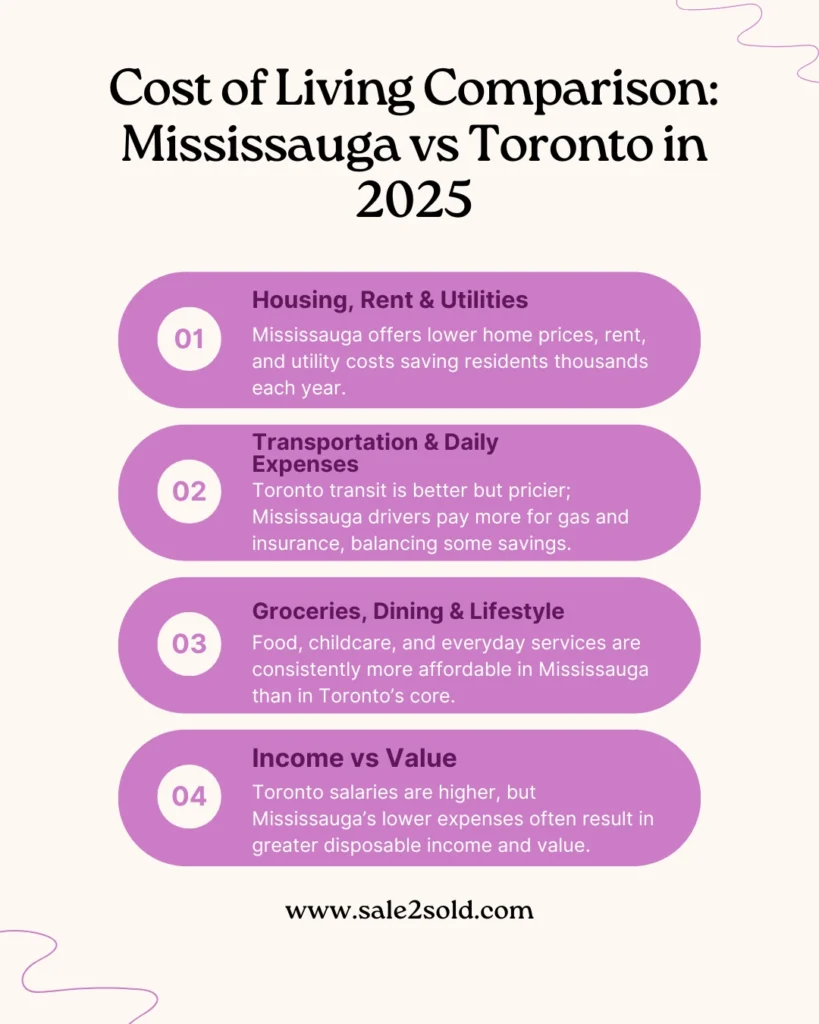Mississauga and Toronto Cost of Living 2025 Comparison


The Mississauga and Toronto cost of living is a topic many families, newcomers, and professionals are analyzing in 2025. Both cities are part of the Greater Toronto Area, yet they offer very different lifestyles and expenses. Toronto is the bustling urban core with endless opportunities, while Mississauga is known for its suburban comfort and slightly lower prices. Understanding where your money goes in each city can help you make the right decision about where to live.
Table of Contents
ToggleIn 2025, data continues to show that Mississauga is more affordable than Toronto. The cost of living index reveals that Toronto remains one of Canada’s most expensive cities, with prices in housing, dining, and services outpacing those in surrounding areas. Mississauga, although not cheap, offers a softer blow to your budget.
To put it simply, if you need $4,500 a month to live comfortably in Toronto, you might only need about $4,000 in Mississauga and Toronto cost of living is to maintain a similar lifestyle. This difference may not look dramatic, but when you calculate it annually, it means several thousand dollars saved. The Mississauga and Toronto Cost of Living comparison highlights these small yet significant gaps across various expense categories.
Housing is where the difference becomes most noticeable. Toronto rents have climbed steadily, especially for apartments in central locations. A one‑bedroom apartment in downtown Toronto can easily cost over $2,400 a month, while a similar unit in Mississauga averages closer to $1,900 to $2,000. For families, larger two or three bedroom units in Mississauga remain much more accessible than in Toronto.
If you’re considering buying a home, the price gap is even wider. Detached houses in Toronto often exceed $1.4 million, while similar properties in Mississauga average closer to $1 million. Semi‑detached homes and condos follow the same pattern, making Mississauga a better choice for long term affordability. Lower property taxes further add to the savings.
This apparent difference in housing costs forms the backbone of the Mississauga and Toronto Cost of Living contrast.
While housing costs grab attention, utilities and services also play a role in monthly spending. In Mississauga and Toronto cost of living, the average household spends slightly less on electricity, water, and heating. Internet packages are also marginally cheaper compared to Toronto. These may seem like minor differences maybe $30 to $50 a month but they accumulate over time.
Basic home services, like cleaning and minor repairs, often cost less in Mississauga. The demand pressure is not as intense as in Toronto’s core, where service providers charge premium rates. For those working with tight budgets, these small savings contribute to a lower overall cost of living.
Transportation costs vary based on your lifestyle. Toronto offers an extensive public transit system, which is convenient and cheaper than owning a car. A monthly pass in Toronto costs slightly more than in Mississauga, but it provides access to a larger network. Mississauga’s transit is improving, but many residents rely on personal vehicles, which adds expenses like fuel, maintenance, and insurance.
Car insurance rates are higher in Mississauga and Toronto cost of living, which offsets some of the savings from cheaper rent. Gas prices are also slightly higher in suburban areas. For those commuting to Toronto daily, the cost of parking, train fares, and travel time must be factored in. This is an integral part of the Mississauga and Toronto Cost of Living equation especially for professionals who work in Toronto but live in Mississauga.
When it comes to groceries, Mississauga and Toronto cost of living often has an advantage. Prices for staples like milk, eggs, chicken, and vegetables are typically lower compared to Toronto. Downtown grocery stores in Toronto usually charge higher prices due to increased operating costs.
Dining out is another area where Mississauga wins. A casual restaurant meal may cost around $20 to $25, while in Toronto, it’s not unusual to pay $30 or more for the same quality. For families or people who eat out frequently, these differences quickly become noticeable.
The Mississauga and Toronto cost of living gap becomes clear here: daily expenses are consistently lower in Mississauga, helping residents keep more money in their pockets.
Lifestyle expenses vary depending on what you value. Entertainment, gym memberships, and personal care services cost slightly less in Mississauga than in Toronto. Movie tickets, fitness centers, and salon visits are all cheaper by a small margin, but again, these add up.
Childcare costs also differ, with Mississauga and Toronto cost of living generally offering more affordable daycare options. For families, this makes a significant impact because childcare can consume a large portion of monthly income. Healthcare services that fall outside the provincial plan such as dental or physiotherapy are also marginally cheaper in Mississauga.
For anyone raising kids or planning long term living, these differences enhance the appeal of Mississauga in the Mississauga and Toronto Cost of Living comparison.
Toronto does offer higher average salaries, especially in industries like finance, law, and tech. However, the higher wages often fail to compensate for the city’s elevated expenses fully. The additional income can be quickly absorbed by rent, commuting, and daily expenses.
Mississauga and Toronto cost of living salaries may be slightly lower, but because expenses are more manageable, residents often feel they have more disposable income. For remote workers or those with jobs not tied to Toronto’s core, living in Mississauga means lower expenses without sacrificing income opportunities.
This is a critical factor when comparing the Mississauga and Toronto Cost of Living a higher salary in Toronto doesn’t always mean better financial stability.
Overall, Mississauga is the more affordable option in 2025. Housing, groceries, utilities, and services are all cheaper, making it attractive for families, newcomers, and anyone looking to save. Toronto, while expensive, offers benefits that some people value more than the cost savings proximity to work, nightlife, and cultural amenities.
If your priority is maximizing your budget and living space, Mississauga and Toronto Cost of living is the clear winner. If you value convenience, urban lifestyle, and access to city opportunities, Toronto may still be worth the higher price.
The Mississauga and Toronto Cost of Living comparison clearly shows that Mississauga offers better value for money, particularly for families and those who prioritize space and affordability. Toronto remains appealing for its vibrancy and job market, but comes with a premium price tag. Choosing between the two depends on what matters more to you: saving money or embracing the city lifestyle.